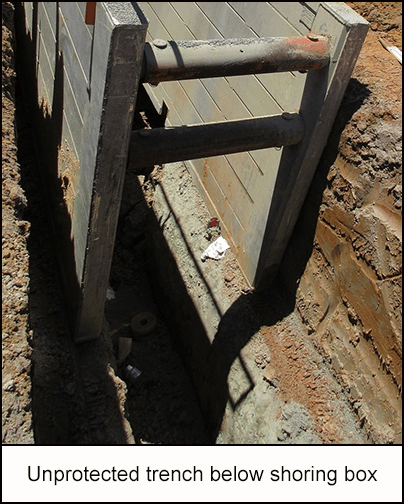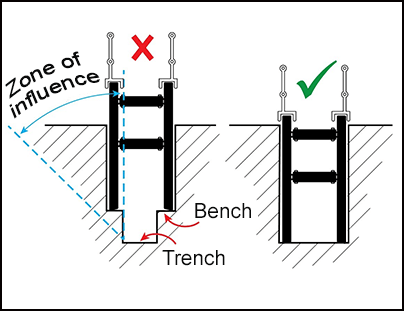-
What happened?
Two separate incidents involved workers being injured by ground collapse in trenches.
In both incidents the shoring box did not extend for the complete depth of the trench.
Incident 1:
A worker was kneeling in an unshored section of a trench.
They were one metre below the bottom edge of the shoring box.
The ground collapsed suddenly and immersed the bottom half of their body.
Incident 2:
The second incident was very similar, resulting in injuries to the worker.

-
Why did it happen?
The shoring box did not go down the full depth of the trench.
When used incorrectly, the weight of the shoring box can increase the chances of the ground collapsing because the trench wall has a load applied in its zone of influence (see image).
Unshored trenches can collapse for a variety of reasons (type of ground, ground water, rain and load applied to the ground).

-
What did they learn?
Shoring boxes are very effective but will only prevent trench collapse when installed correctly:
- Shoring boxes should extend for the complete depth of the trench.
- Should be installed in accordance with manufacturer’s instructions.
On the rare occasion a shoring box rests on structurally sound rock, it may not need to extend the full depth, but this must be signed off by a geotechnical engineer before use.

-
Ask yourself or your crew
How can this happen here? What measures do we have in place to prevent it from happening?
Have you ever worked in a trench that wasn’t shored correctly? What did you do?
How do you check that the shoring boxes are installed correctly, and the area is safe to work in?
What risk assessments do you carry out before starting work in a trench?
What other hazards are associated with working in trenches?

Add to homescreen
Content name
Select existing category:
Content name
New collection
Edit collection
What happened?
Two separate incidents involved workers being injured by ground collapse in trenches.
In both incidents the shoring box did not extend for the complete depth of the trench.
Incident 1:
A worker was kneeling in an unshored section of a trench.
They were one metre below the bottom edge of the shoring box.
The ground collapsed suddenly and immersed the bottom half of their body.
Incident 2:
The second incident was very similar, resulting in injuries to the worker.

Why did it happen?
The shoring box did not go down the full depth of the trench.
When used incorrectly, the weight of the shoring box can increase the chances of the ground collapsing because the trench wall has a load applied in its zone of influence (see image).
Unshored trenches can collapse for a variety of reasons (type of ground, ground water, rain and load applied to the ground).

What did they learn?
Shoring boxes are very effective but will only prevent trench collapse when installed correctly:
- Shoring boxes should extend for the complete depth of the trench.
- Should be installed in accordance with manufacturer’s instructions.
On the rare occasion a shoring box rests on structurally sound rock, it may not need to extend the full depth, but this must be signed off by a geotechnical engineer before use.
Ask yourself or your crew
How can this happen here? What measures do we have in place to prevent it from happening?
Have you ever worked in a trench that wasn’t shored correctly? What did you do?
How do you check that the shoring boxes are installed correctly, and the area is safe to work in?
What risk assessments do you carry out before starting work in a trench?
What other hazards are associated with working in trenches?
Two workers were injured in separate incidents when the ground collapsed in the trenches they were working in. The shoring boxes were not the full depth of the trench.








